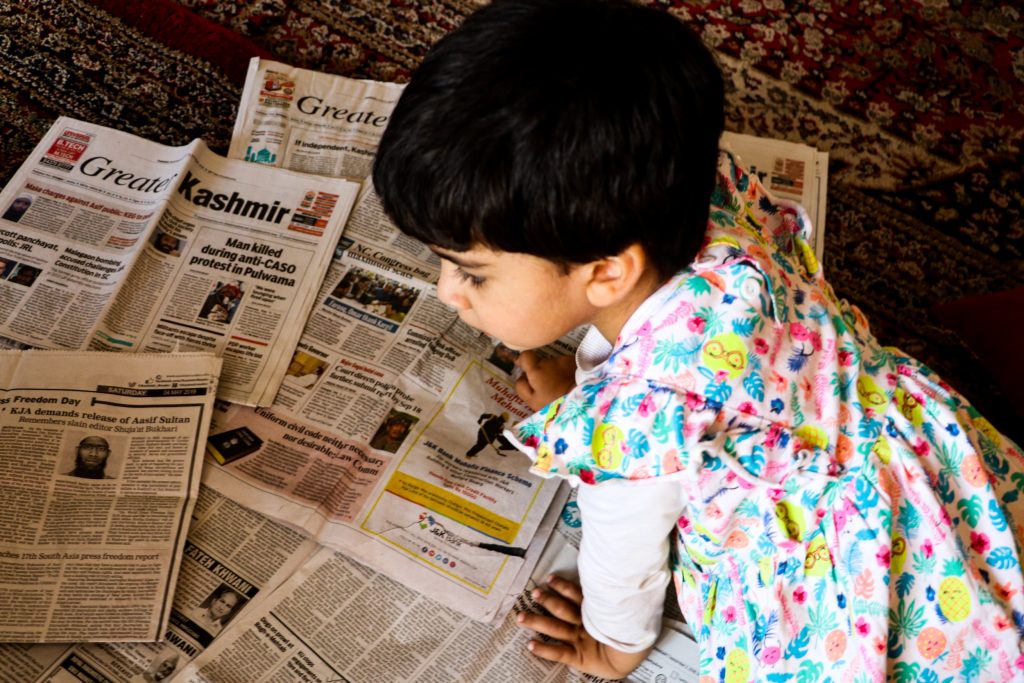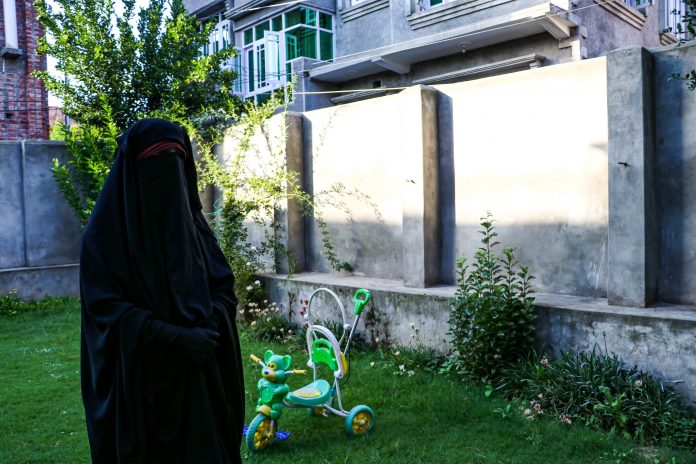Kashmiri journalist Aasif Sultan has spent more than 800 days in prison under ‘terror’ charges, which his family and media bodies have categorically dismissed. Aasif’s continued two-year-long detention has had a severe toll on his family’s mental and economic health. Memories and hope is what they clung onto. This is their story.
By Asma Hafiz, TwoCircles.net
“Areeba baba katte chui?”
(Areeba, where is your father?)
“Jailas manz.”
(In jail)
“Baba kem nyemut?”
(Who took your father?)
“Polichan.”
(Police did.)

Srinagar: In the brightly lit living room, two-year-old Areeba hides behind the curtain, alarmed by the presence of a stranger in her house. Taking slow deliberate steps, she climbs into her mother’s lap and stares at me. Planting a kiss on her daughter’s cheek, Sabina recalls the night of 27 August 2018, when her husband Aasif Sultan, a journalist based in Srinagar (Kashmir) was detained and taken into police custody.“There was a loud bang on the door. From the window, I could see our house was surrounded by 50-60 soldiers. When my father-in-law opened the door, they asked, ‘Where is Aasif?’ We were told to stay in the kitchen while the police searched the house. They left after midnight, taking Aasif with them,” says Sabina.
As Aasif was bundled into a military vehicle, his family was assured that he would be returned the next day. Two years later, he continues to be in prison.
During the nocturnal raid, the police confiscated Aasif’s laptop and all the mobile phones in their home. According to the family, Aasif came into limelight after he wrote a detailed account, for a local magazine, on the rise of Burhan Wani, a popular militant commander who was killed in the summer of 2016. Following his arrest, Aasif was booked under Unlawful Activities (Prevention) Act (UAPA), a stringent law that gives the government the power to label a person as “terrorist” for “harbouring and supporting known militants”, an accusation out rightly denied by the family.

Running around the room with a chocolate bar in her hand, Areeba hums a tune punctuated with her giggles. She was barely six-months-old when her father was incarcerated. Sabina grew anxious when her daughter started calling her uncle Baba. From then on, she knew she had to do something to keep Aasif’s memory alive in their daughter’s life. She would constantly show Areeba the photos of her father, trying to stamp this image in her mind.
“We were at a family function when one of her cousins, who is of her age, started crying, asking his father to take him out. On seeing this, Areeba asked for her father too. All I could do was embrace her and weep,” says Sabina.

For Sabina, the wounds run deep. Juggling between the court and jail visits and raising a child, she longs for her husband’s support and care. Women and children often have to bear the brunt of the wrath unleashed by the multi-layered Kashmir conflict. Even though the Kashmir issue has been discussed on an international level time and again, cases such as the imprisonment of Aasif Sultan symbolises the continued oppression of its people.
In Kashmir, almost everybody’s memory is blotted with separation and loss.
A worn-out photo album rests on a shelf in one of the corners of the room. Areeba reaches out and grabs the album saying, “Wich myon Baba” (See my father). Scattering the photographs, she points out to a childhood photo of her father, happy that she could recognize him. Areeba thinks her father lives inside the photographs and that she is occasionally allowed to meet him or talk to him on phone. “Her idea of a father is completely different but she knows he is somewhere near and will come to meet her soon. She has designated a special spot in the kitchen for him, saying he will sit there when he returns home,” says Sabina.

All Sabina sought was a simple answer: why was her husband taken away? Even while battling the challenges of raising her daughter alone, Sabina found strength in her own way. She had taken upon herself the daunting task of filling the void in Areeba’s life. For every jail visit, she would take her daughter along with her. While crossing the checkpoints, Areeba would sob as she was prodded and checked by strangers. “They don’t even spare her diapers. It hurt me to see her going through this and I would silently stand there and cry with her. But it was important that she meet her Baba,” adds Sabina.

Aasif’s study room is dimly-lit, pulsating with the memories of the time when he used to work as a journalist. A white-board hangs from the wall with writings from two years ago. In the drawer of the study-table rests his press ID card that reads: Assistant Editor, Kashmir Narrator. For Areeba, this card is the only tangible way to feel her father’s presence in the house. She cradles it, showers it with kisses and plays with it. In a folder, her mother has neatly stacked all the newspapers that wrote about Aasif’s incarceration. Sabina says creating a “memory folder” is her way of resisting persecution. She believes her husband’s detention is an attack on press freedom in Kashmir.
On 27 August, the Committee to Protect Journalists (CPJ), an independent non-profit, non-governmental organization based in New York, along with 400 journalists, academics, civil society members wrote a letter to Prime Minister Narendra Modi asking for the immediate release of Aasif Sultan. To stand in solidarity with the detained journalist, CPJ also had a poster published in The Washington Post. Aasif was also awarded the John Aubuchon Press Freedom Award for his journalistic writing by the American National Press Club. Despite mounting international pressure, the case hearings are proceeding at a snail’s pace. The recurrent lockdowns in Kashmir have resulted in the continuous postponement of the court hearings.

“We have about 50 witnesses and so far only 3 have appeared in court. If the hearing advances at this rate, it will take more than a decade to just get the statements of these witnesses,” says Mohammad Sultan, Aasif’s father.
Aasif’s absence has taken a toll on his family members. His parents suffer from different medical conditions and the memories of their son haunt them as they try to come to terms with their predicament. In these tough times, they say, Areeba offers them a glimmer of hope and keeps them going.
“I keep telling my wife that you are alive today because of Areeba. She and her mother is the source of our strength,” says Mohammad Sultan.

The case of Aasif Sultan is a stark reminder of the various forms of rights violations in the disputed region of Indian-administered Kashmir. The recurring episodes of violence and the attempt to muzzle the press lays bare the enormity of the situation. Speaking about the psychological trauma she had to go through, Sabina says: “I used to have sleepless nights and there were days when I felt like giving up. One day, Areeba came to me and told me that she had met her Baba and he brought her colours. I understood she had dreamt of him. I am ready to fight this battle no matter how hard it is. For Areeba and my family, I will.”


